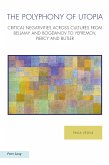Shockwaves of Possibility explores the deep utopianism of one of the most significant modern cultural practices: science fiction. The author contends that utopianism is not simply a motif in SF, but rather is fundamental to its narrative dynamics. Drawing upon a rich array of theory and criticism in SF and utopian studies, the book opens with a global periodizing history that shows the inseparability of SF from developments in other cultural fields. It goes on to examine literature, film, television, comics, and animation in order to demonstrate SF's unique effectiveness for grappling with the upheavals brought about by globalization. Shockwaves of Possibility proves SF's vitality in the brave new world of the twenty-first century, as it illuminates the contours of the present and educates our desire for a radically other future.
«[...] this is an important study that will shape our conversations about science fiction and form for years to come, one that irrefutably demonstrates the critical importance of this genre to the literature of social justice.»
(American Literary History, ALH Online Review Series XIII)
Read the full review here
(American Literary History, ALH Online Review Series XIII)
Read the full review here








